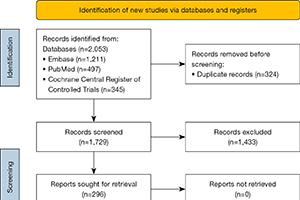Benjamin T. Muston, James Bilbrough, Aditya Eranki, Christian Wilson-Smith, Ashley R. Wilson-Smith
AbstractBackground: Atrial fibrillation (AF) is the most common cardiac arrhythmia and leading cardiac cause of stroke. Catheter and surgical ablation are two techniques used currently to resolve prolonged disease by limiting the excitatory potential of specific areas of myocardium in the atria of the heart. The aim of this systematic review and meta-analysis was to provide a graphical amalgamation of mid-to-long-term rhythm outcomes following transcatheter and surgical intervention, whether primary or concomitant ablation.Methods: Three electronic databases were selected to complete the initial literature search from inception of records until April 2023. Primary outcomes were freedom from AF at 12 months, as well as long term time-to-event recurrence data. These data were calculated using aggregated Kaplan-Meier curves according to established methods. The secondary outcome was procedural time for each ablation method.Results: Following independent screening, 36 studies were included for analysis. A total of 6,700 patients were followed, of whom 4,863 (72.6%) were male. Freedom from AF recurrence at 1, 3 and 5 years for the surgical cohort was 71.7%, 57.6% and 47.6%, respectively. Comparatively, the recurrence rates of the catheter ablation cohort at 1, 3 and 5 years were 71.5%, 56.5% and 50.3%, respectively.Conclusions: Despite potentially more complex diseases, surgical ablation patients have non-inferior long-term AF recurrence when compared to those undergoing catheter ablation. Recurrence at 12 months as well as procedural time are also similar between these groups. Ultimately, both ablation methods were able to prevent recurrence of AF in approximately 50% of patients at five years following the procedure.
Cover
留言 (0)